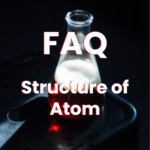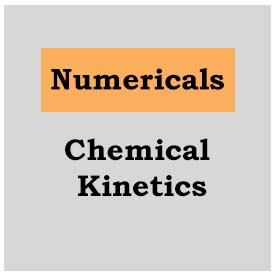Elevation in boiling point
1)The boiling point of a solution containing 50g of a non-volatile solute in 1 kg of solvent is 0.5o higher than that of the pure solvent. Determine the molecular mass of the solute. (Molecular mass of the solvent is 78 g/mol, Kb for the solvent = 2.53 K m-1)
Ans: 253 g/mol
2)On dissolving 3.24g of sulphur in 40g of benzene, boiling point of the solution was higher than that of benzene by 0.81 K. The molal elevation constant (Kb) for benzene is 2.53 K Kg/mol. What is the molecular formula of sulphur? (Atomic mass of sulphur is 32g/mol)
Ans: S8
3)Calculate the boiling point of a solution containing 0.456 g of camphor ( molar mass = 152 g/mol) dissolved in 31.4 g of acetone (b.p= 329.45 K). Given that the molecular elevation constant per 100 g of solvents is 17.2 K.
Ans: 329.614 K
4)18 g of glucose is dissolved in 1 Kg of water. At what temperature will water boil under 1.013 bar pressure? Given Kb for water is 0.52 K kg mol-1.
Ans: 373.052 K
5)0.70 g of an organic compound when dissolved in 32 g of acetone produces an elevation in boiling point of 0.25O C. Calculate the molecular mass of the organic compound. ( Kb for acetone = 1.72 k Kg mol-1)
Ans: 150.5 g/mol
6)0.90 g of a non-electrolyte was dissolved in 87.9 g of benzene. This raised the boiling point of benzene by 0.25oC. If the molecular mass of the non-electrolyte is 103 g/mol, calculate the molal elevation constant for benzene.
Ans: 2.52 K kg mol-1
7)Calculate the molal elevation constant for water given that 0.2 molal solution of non-volatile and non-electrolyte solute increases the boiling point of water by 0.104 K.
Ans: 0.52 K Kg mol-1
8)A solution containing 0.5126 g of naphthalene of molecular mass 128 g/ mol in 50 g of CCl4 gave a boiling point elevation of 0.402 K while a solution of 0.6216 g unknown solute in the same mass of carbon tetrachloride gave a boiling point elevation of 0.647 K. Find the molar mass of the unknown solute.
Ans: 96.44 g mol-1
9)A solution prepared by dissolving 1.25 g of methyl salicylate in 99 g of benzene has a boiling point of 80.31 oC. Determine the molar mass of this compound (b.p of pure benzene is 80.10 oC and Kb for benzene is 2.53 K Kg mol-1.
Ans: 152.12 g/mol
10)What would be the molar mass of a compound if 6.21 g of it dissolved in 24 g of chloroform forms a solution that has a boiling point of 68.04oC? Given that the boiling point of pure chloroform is 61.7oC and Kb for chloroform is 3.63 Km-1.
Ans: 148.15 g/mol
11)For a dilute solution containing 2.5 g of a non-volatile and non-electrolyte solute in 100 g of water, the elevation in boiling point at 1atm pressure is 2oC. Assuming that the concentration of solute is much less lower than the concentration of the solvent, what is the vapour pressure of the solution? (Kb = 0.76 K kg mol-1)
Ans:723.12 mm
Elevation in boiling point with van't Hoff Factor
1)An aqueous solution containing 1.248 g of barium chloride ( molar mass =208.34 g mol-1) in 100 g of water boils at 100.0832oC. Calculate the degree of dissociation of barium chloride. (Kb = 0.52 K kg/ mol)
Ans: 83.5%
2)Calculate the boiling point of solution when 2 g of Na2SO4 ( molar mass = 142 g/mol) was dissolved in 50 g water assuming that Na2SO4 undergoes complete ionization (Kb for water = 0.52 K kg /mol)
Ans: 373.44 K
3)A 2.0 molal solution of sodium chloride in water causes an elevation in boiling point by 1.88 K. What is the value of van’t Hoff factor? What does it signify? (Kb= 0.52 K Kg/mol)
Ans: 1.8076
4)Calculate the boiling point elevation for a solution prepared by adding 10g of CaCl2 to 200 g of water. (Kb for water = 0.512 K Kg mol1, Molar mass of CaCl2 = 110g/mol)
Ans: 0.69 K








